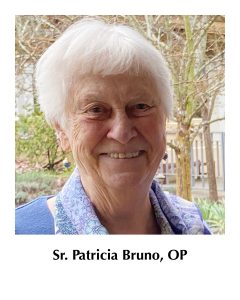- All
- Wisdom
- We Stand on Their Shoulders
- Vocation
- Uncategorized
- Stories Seldom Heard
- Spirituality
- Social Justice
- Prayer
- Peace
- Oneness
- Love
- Letting Go
- Lent
- Joy
- Inspirational Images
- Hope / Healing
- Holy Week
- Gratefulness
- God's Presence
- General News Stories
- Forgiveness
- Finding God
- Faith
- Easter
- Dominican Saints
- Discipleship
- Courage
- Christmas
- Catholic Sisters Week
- Care of the Earth
- Blessing
- Beauty
- Advent
- #justiceOPportunity
Stories Seldom Heard—A Lament
Sr. Patricia Bruno, OP

272nd Edition, March 2022
 There is an old saying that many of us remember. “March comes in like a lion, out like a lamb.” March is the month that straddles the line between winter and spring. March starts with cold weather and leaves with springtime temperatures. However, I’m afraid our weather is not that predictable anymore.
There is an old saying that many of us remember. “March comes in like a lion, out like a lamb.” March is the month that straddles the line between winter and spring. March starts with cold weather and leaves with springtime temperatures. However, I’m afraid our weather is not that predictable anymore.
The weather is not the only part of our lives that we find hard to predict. As we begin the month of March, our hearts are heavy. The news of Ukraine multiplies our distress. Daily we see the faces of families fleeing and hear the sounds of war machines traveling into new territories. As our fingers move over the face of our world maps, hundreds of tear-streamed faces come to mind. Too much struggling and death to understand. Too much pain to absorb.
Years ago, I visited the Children’s Holocaust Memorial in Jerusalem. As I entered into the darkness of the children’s memorial building and my eyes became accustomed to the dark, I began to see pinpoints of lights. It felt as though I was standing alone in a vast field of silence under the night sky. But soon the emptiness was filled as a voice interrupted the silence. One by one I heard the names, ages, and hometowns of those lost children of the holocaust. Their presence then and now is palpable.
At that time, we heard the cry. “Never again.” Yet, the cruelty and greed that reigned in parts of our world continue to erupt. Over these last years, we have heard laments from almost every nation in the world including our own. It has been a time of soul searching and prayer for all of us. Some of us have relatives, friends, or special connections with people in other countries. Just today a woman, I’ll call her Anne, expressed her particular connection and grief for the Ukrainian people. Twenty years ago, when she was participating in a Cultural Exchange Program between the University of CA. at Davis and residents in Uman-Ukraine, one of her paintings, “Resurrection” was exchanged for a wooden icon of St. John of Chrysostom, made by a young, Ukrainian man named Oleg. Now Anne wonders what has become of Oleg and her painting. She hopes it is giving inspiration and strengthening the faith of the ones who see it. She hopes the painting will help them know that God and others hear their cry and are working for Peace. Not all of us have personal connections. Not all of us can be physically present. Yet, all of us can and have made contributions, in a variety of ways, to alleviate some of the pain and injustice of those who are suffering. Financial support, thoughtful presence and awakening others to the ways they might help go hand in hand with prayer.
I have heard some people on the news who have gone through profound personal tragedies say. “Prayers and thoughts are not enough.” Yet, for us who cannot be on the front lines, prayer is an essential nonviolent way of disrupting the flow of greed and the anger and pride of the oppressors. We know that our commitment to prayer and continual acts of generosity carve out within us and our world deep rivers of courage and peace that flow beyond our places of prayer and seep through our national borders to enter into the hearts and minds of those who are on the front lines blocking aggression.
One way to pray for those who are suffering is to join them in prayers of lament. As you know two-thirds of the one hundred and fifty psalms are laments. Even though the psalms were written over two thousand years ago, they express the same deep emotions we are experiencing as a result of the wars abroad, the unrest within our nation and church and those who cry out for daily bread throughout the world.
Psalm 86 is a Lament. The cry for help of the one who is praying this psalm cannot be missed. “Listen to me, God, and answer me, poor and needy as I am.” One of the striking elements of this psalm is that after it begins with this desperate plea for help there is no mention of the pain and anguish again until the very end of the psalm. Instead of a cry for help, the next stanzas are filled with words of praise. It expresses a strong confidence in God’s listening and faithful attention.
The psalmist is no stranger to prayer. The psalm is prayed by a faithful person. She/he describes her/himself as “your devoted one” and a “servant who relies on you (God).” The one praying this psalm is clear about her/his feelings about God. There is “no God to compare with you (God), no achievement to compare with yours (God).” God is not some far-off spirit, but a powerful and faithful friend. God is “good and forgiving” and hears the plea of those who call for help. (86:6) The psalmist’s sincerity is open and without guile or nuance. “I thank you with all my heart,…I glorify your name forever, your love for me has been so great.”
The psalmist paints a compassionate portrait of God. Contrary to the image some people present as the God of the First Testament (Old Testament) as being vengeful and unforgiving, verse 15 sets the records straight. “O God, you are always merciful and tenderhearted, slow to anger, always loving, always loyal…” (86:15) This theme of the loving compassionate God is reiterated throughout the First Testament in a variety of ways: the books of the prophets, the stories of forgiveness and especially in the psalms, even the Psalms of Lament. What comforting words not only for the Israelites to hear in times of trial, but also for us in our daily lives. The psalmist has found a real friend, one on whom she/he can rely day in and day out. Even though these words are prayed long ago, they are also offered to us as an invitation. If we are looking for a true friend and a faithful companion, the psalmist points us in the right direction. God is constant, loyal, compassionate, and merciful. Who wouldn’t want a friend like that?
God is not fragile. We don’t have to handle God with kid gloves. In fact, as with any true, strong relationship God knows that the expression of raw unguarded lament is a sign of deep trust and confidence. When we bear our lives before God unabashedly in our weakness and despair God will never turn away from us.
The Psalms of Lament raise many questions about suffering. Why do innocent people suffer? Does God cause suffering? Many of us have read Rabbi Harold S. Kushner’s book entitled When Bad Things Happen to Good People. It is an acclaimed national bestseller. It is one of those books I keep for rereading because even though the situation might be different, Kushner’s approach to disillusionment, disappointment, and anguish is still enlightening. There is no one correct way of writing our reflections and expressing our grief. “The format is not important, but the prayer is.” In Mary Oliver’s poem, there is a sense of urgency. Even though she might want to think of pleasant things, the crisis in the world demands her prayerful lamentation.
“Meanwhile I bend my heart toward lamentation
Where, as times implore our true involvement,
The blades of every crisis point the way.
The format is not important, but the prayer is.” (2)
- Rabbi Harold S. Kushner, When Bad Things Happen to Good People, Avon Books, 1350 Avenue of the Americas, New York, New York, 10019. 1981
- “A Dream of Trees” by Mary Oliver
There is a thing in me that dreamed of trees,
A quiet house, some green, and modest acres,
A little way from factories, schools, town,
I would have time, I thought, and time to spare,
With only streams and birds for company,
To build out of my life a few wild stanzas.
And then it came to me, that so was death,
A little way away from everywhere.
There is a thing in me still dreams of trees.
But let it go. Homesick for moderation,
Half the world’s artists shrink or fall away.
If any find solution, let him tell it.
Meanwhile, I bend my heart toward lamentation
Where, as times implore our true involvement,
The blades of every crisis point the way.
I would it were not so, but so it is.
Whoever made music of a mild day?
